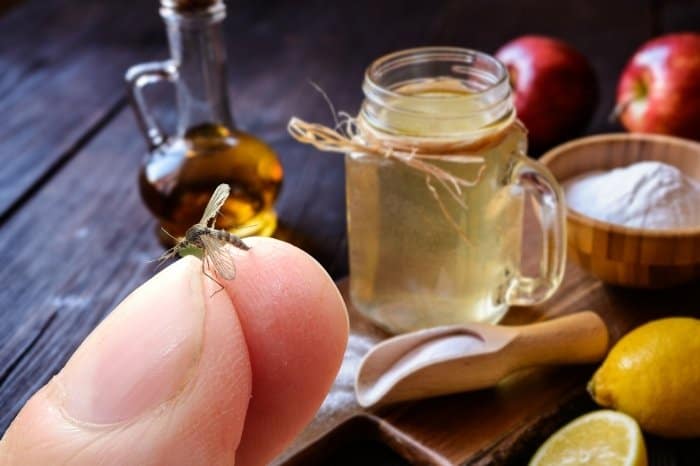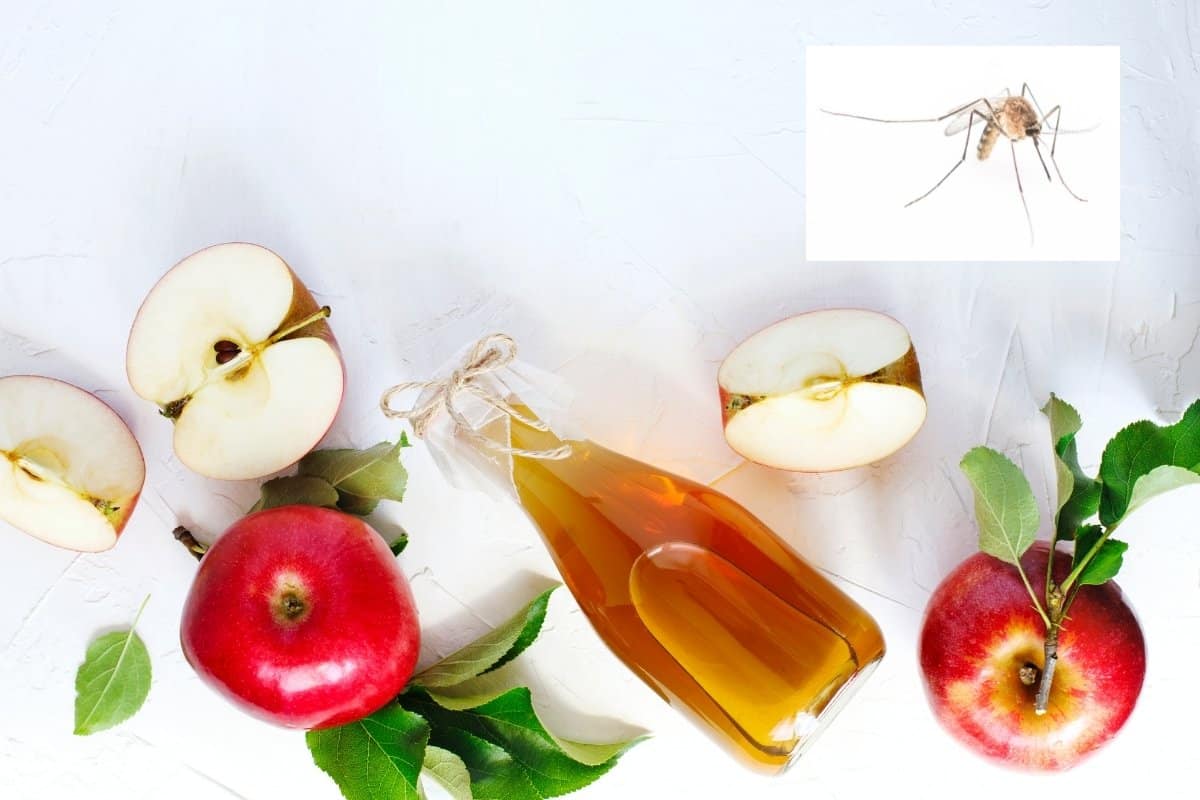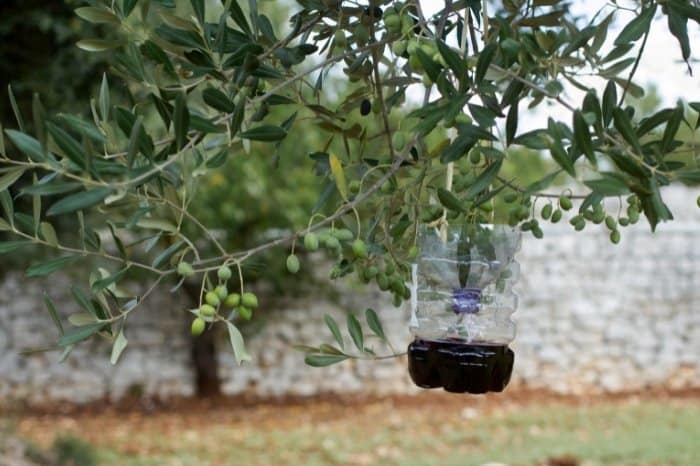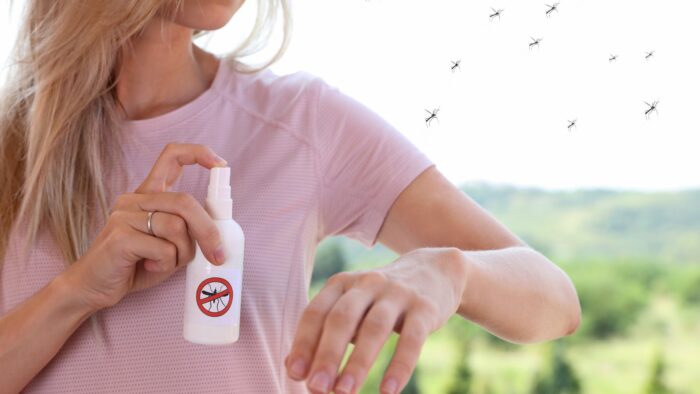Last Updated on March 19, 2023 by Griselda M.
In this blog post, we answer the question, does vinegar kill mosquitoes and much more. So, does vinegar repel mosquitoes, or is it just heresy or old wives’ tales being peddled to gardeners who need to eliminate these insects?
Mosquitoes hate the smell of vinegar, and therefore, using it correctly can deter mosquitoes from biting you at night.
Due to the vinegar’s acidic nature, this product effectively fights and eliminates fungi, bacteria, and other microorganisms. The strong smell is also incredibly effective in driving away insects like mosquitoes.
Vinegar has a powerful and penetrating smell that is unpleasant for mosquitoes and other bugs. If these insects smell or encounter vinegar, they tend to flee from it.
Using vinegar correctly aids in keeping your home free from mosquitoes, even during the hot summer season when they are prevalent. Have a look at the information below to learn more about the ratios of vinegar solutions to get rid of these bloodsuckers.
So Does Vinegar Keep Mosquitoes Away?
Yes, vinegar works to keep mosquitoes away due to its overpowering smell. Vinegar that does help with repelling mosquitoes is white vinegar which is commonly used to get rid of these nuisances. However, on its own, it is not effective; you must mix it with water for it to work.
Mosquitoes taste using their legs, and the moment they encounter any chemical that has a strong taste, like vinegar, they fly away. Additionally, if you also consume enough vinegar, like Apple Cider Vinegar, you strengthen your body’s natural odor to repel mosquitoes and other insects.

If you don’t like taking vinegar, you can also spray it on yourself as a form of DIY mosquito spray. You can also kill mosquito larvae before they grow into mature insects by using 15% vinegar and 85% water solution. This solution takes 18 hours to kill the larvae.
How to Use Vinegar to Repel Mosquitoes
There are various ways you can use vinegar as a mosquito repellant. These methods include:
Vinegar in a glass
This is an easy method that requires you to fill a glass with a white vinegar solution and place it on a surface in your chosen area – bedroom, kitchen, living room, etc.
The smell that the vinegar releases keeps the mosquitoes away. In addition, if you place a full vinegar glass next to a window, it functions as a major way of keeping mosquitoes away from your home.
Vinegar and citronella repellent
You can prepare a homemade vinegar bug repellant by combining vinegar with citronella. Citronella is a beautiful natural product that repels small insects. Mosquitoes cannot stand the citrus fragrance of citronella.
To prepare this solution, dilute about 10 drops of citronella oil in 30 ml of olive oil and add a tablespoon of vinegar to the mixture. Place this mixture in your chosen areas or use it as a spray.
Artizen Citronella Essential Oil (100% Pure & Natural – Undiluted) Therapeutic Grade
Repellent of vinegar and eucalyptus oil
Eucalyptus oil is a perfect remedy to drive away mosquitoes. Just like citronella, the eucalyptus fragrance is unbearable to mosquitos.
Mix 1/3 cup of vinegar plus 1/3 cup of alcohol and 10 drops of eucalyptus essential oil. Pour this mixture into a spray- bottle and spray it in mosquito-infested areas!
Trap mosquitoes with vinegar
Another way to use vinegar to repel mosquitoes is by trapping them. Apple cider vinegar works best in making a homemade trap for mosquitoes. Apple cider vinegar carries a sweet smell that attracts mosquitoes to the web, allowing you to catch and destroy them. Follow these steps to eliminate those nagging mosquitoes using apple cider vinegar.
- Pour a good amount of apple cider vinegar into a bottle.
- Use a piece of paper to make a funnel and place it in the mouth of the bottle.
- Place the bottle in an area where mosquitoes are prevalent.
The mosquitoes are attracted by the aroma of the apple vinegar and enter the bottle through the funnel, thus trapping themselves. You can also use a tall glass if you don’t have a bottle.
Other Home Remedies to Repel Mosquitoes
Besides vinegar, there are other home remedies that you can use to keep mosquitoes away. They include:
- Lemon with cloves. Cut a lemon open and place some cloves in the middle. Place it in different parts of the house, for example, next to the windows. The smell of the mixed ingredients keeps the mosquitoes away.
- Lavender repellent. Use 100 ml of lavender essential oil and add it to your skin moisturizer. Using this ointment on your skin will act as a repellent, keeping mosquitoes from biting you at night.
- Lemon or orange leaves. Boil a few orange leaves and lemons and then put them in an uncovered container. Place the container at the point of the house you want to protect.
- Mosquito-repellent plants. You can grow many plants in the garden, terrace, windows, etc., to eliminate house mosquitoes. The most popular mosquito plant repellents include basil, citronella, calendula, eucalyptus, and catmint.
Does Vinegar Offer Long-Term Help?
Vinegar offers short-term and limited help when fighting against bugs and mosquitoes. It cannot be used on its own as a long-term solution for mosquito infestation. Why is that? Vinegar on its own is not enough to treat an entire infestation. It is not as effective when used as a stand-alone treatment against serious cases of infestation.
Furthermore, vinegar is not able to penetrate the hard casings that protect bug eggs. It cannot repel pests completely from your property.
Overusing the vinegar spray option means soaking the entire room with the liquid’s pungent corrosive smell. However, to get the best results, you can use it together with lavender, cinnamon, lemongrass, clove, tea tree, and peppermint oils to repel bugs, especially mosquitoes and bed bugs.
More Uses of Apple Cider Vinegar for Pest Control
Apple cider vinegar is commonly used in most homes in various ways. Let’s look at some ways it can be used.
It is used to repel and eliminate common pests, both indoors and outdoors. Most people use it to eliminate fruit flies from the house using a fruit fly vinegar trap.
Apple cider vinegar is great at repelling ants.
If you are experiencing an aphid problem in your garden, use apple cider vinegar to get rid of them. To make the solution, mix an ounce of apple cider vinegar with 3 ounces of water in a bottle. Spray this solution on your plants to keep the aphids off. Do not spray too much vinegar, as it could affect some plants that don’t like too much acidity.
How Long Does Apple Cider Vinegar Repel Mosquitoes?
Do you want to know how long apple cider vinegar repels mosquitoes? Using this vinegar to get rid of these bloodsuckers is great, as it works quite effectively. To answer the question honestly, a solution of apple cider vinegar and water that is sprayed on surfaces can last as long as the smell lingers. This is because mosquitoes are not fond of the pungent stench of apple cider vinegar, and therefore prefer to steer clear of it.
You can also add the solution to a spray bottle and apply it on your skin to keep them from feasting on your skin. Keep in mind that although this mixture is cheap, it is very effective at getting rid of mosquitoes.
Can Mosquitoes Breed in Vinegar Water?
No, mosquitoes cannot breed in vinegar water unless it has been lying around for ages and has lost their potency. This is because both apple cider vinegar and white vinegar are capable of killing mosquito larvae. However, you must ensure that the solution consists of 85 percent water and 15 percent vinegar to work effectively. This is because a mixture that is too weak may be tolerated by these critters, which can also lead to breeding.
So, to stop mosquitoes from multiplying, an insect repellent that is made up of vinegar and water would work quite well. If you do find larvae in the vinegar and water solution, then you may be dealing with some determined mosquitoes. In this case, you can add any type of vegetable oil to the surface of the mixture, which will serve as a sealant, making it hard for the mosquitoes to breathe. Alternatively, you could also go in for the kill and make a 50/50 vinegar and water solution to get rid of these determined flyers.
How to Get Rid of Mosquito Bites Overnight Home Remedies?
If you want to know how to get rid of mosquito bites overnight home remedies, then we have a few great suggestions for you. We all know that getting bitten by a mosquito is an irritation that can cause a lack of sleep and itching skin. Although this may sometimes be unavoidable, there are a few home remedies that you can use to get rid of the bite. These include a few kitchen staples that most of us should have lying around in the cupboard.
Here are a few home remedies to get rid of these warm-weathered creatures naturally:
Oatmeal for mosquito bites
Because of its anti-irritant compounds, oatmeal is one of the options that you can use to relieve swelling or itching caused by a mosquito bite. To make an effective oatmeal paste, mix equal measures of water and oatmeal until it forms a glue-like paste. Applying the paste to the affected area on your skin and leaving it on for ten minutes would give you relief from the mosquito bite. Thereafter, you can wipe it off your skin.
Crushed ice for mosquito bites
As often seen in sports injuries, cold packs are great for reducing inflammation. In the same way, using crushed ice to relieve the irritation and swelling caused by mosquito bites would prove quite effective. Although the ice is great at numbing the affected area and gives almost immediate relief, it is short-lived.
So, if you are looking to ease the itch and swelling for a while, bundling crushed ice in a cloth and holding it over the affected areas is recommended. Ensure that you do not use the ice directly on the surface of your skin, as it can be harmful. Remember to use the crushed ice pack for not more than five to ten minutes at a time, although this can be repeated in intervals throughout the day.
Honey for mosquito bites
When it comes to home remedies for mosquito bites, honey is very commonly used by folks around the world to relieve irritation and swelling. This also includes medical-grade honey, which contains anti-inflammatory and antibacterial properties that are extremely beneficial. Applying a tiny bit on a mosquito bite can reduce swelling and irritation.
Aloe vera for mosquito bites
Aloe vera possesses a cool gel that is known to provide almost instant relief to skin irritation caused by insect bites, including those left behind by mosquitoes. To acquire the gel and apply it to the affected area, all you have to do is slit the plant open and apply the gel to the bitten area. Leave it on and reapply if there is still irritation once the gel has dried.
Does Vinegar Kill Mosquitoes in Standing Water?
So, does vinegar kill mosquitoes in standing water? The answer is yes, vinegar does kill mosquitoes in standing water. Aside from its repellent properties when mixed with water, standing water also attracts mosquitoes; mostly females, as they need moistness to lay their eggs. The reason for this is that mosquito eggs need water to hatch into larvae.
However, when apple cider vinegar is added to the water, the solution aids in eliminating these bloodsuckers. Just two or three tablespoons of vinegar should do the trick. However, if there is no vinegar present, standing water because the perfect breeding ground for mosquito larvae as they feed on available organisms that float around. Even as little as an inch of water is sufficient for mosquitoes to lay eggs.
So, if you do have an infestation of mosquitoes in your yard, you should investigate and find the water source that they are breeding in. Contaminating that water source with pungent vinegar would be the death of them and their eggs. Keep in mind that consistency would be key in this instance, as, if left neglected, a one-time application of apple cider vinegar in standing water may not be enough.
Do Mosquitoes Hate the Smell of Rubbing Alcohol?
Yes, they do hate the smell of rubbing alcohol; however, it is not effective in getting rid of them. Although you can use rubbing alcohol for several things around your house, repelling mosquitoes is not one of them. But, if you have other pests like bed bugs, then this substance would be a great option.
If you have been bitten by a mosquito, you may be able to ease the itch by applying to rub alcohol directly to it. This should be done with careful care and moderation to avoid becoming the victim of skin irritation in the process. Rubbing alcohol comes in various strengths of isopropyl, which does not really make a difference when used to subside skin irritation caused by mosquitoes.
It is sold at most pharmacies and convenience stores, so it is quite easily accessible if you want to buy it to ease the itch from a mosquito bite. Although some claim that a solution of rubbing alcohol and water sometimes proves effective in riding off mosquitoes, others may disagree because it didn’t work for them. Therefore, trying it out for yourself to see if mosquitoes are attracted or repelled by it would give you a clearer picture of its effects.
Will Bleach Kill Mosquito Larvae in Pool?
If you’ve ever wondered, if will bleach kill mosquito larvae in pool, then the following information would be useful to you. When it comes to the use of bleach for cleaning purposes, it is most commonly used for gutter-cleaning applications. This is because of its effectiveness in eliminating existing mosquito larvae that are breeding in hard to reach most areas like gutters.
When it comes to mosquito larvae in pools, you will need a lot of bleach to get rid of the infestation because of the amount of water it contains. On a smaller scale, the correct mixture will include a tablespoon of bleach to a gallon of water. So, in other words, a 50-gallon pool, for example, would need 50 tablespoons of bleach to rid of these bloodsuckers before they develop further. Keep in mind that bleach has a pH level of between 11 and 15, making it a very strong base to destroy larvae.
Ways to keep your water feature mosquito-free
- Ensure that your pool is free of anything that encourages larvae growth. These include algae and organic debris that are used for both protection and feeding in the developing stages of larvae.
- If you have a water feature with shallow water, then it is an invitation for mosquitoes as it is beneficial for them to multiply. This is because shallow water is best for mosquito larvae to survive. Therefore, having a water feature that is deep and clean is advised.
- If you add fish to your water features, this helps with the promotion of predators that will eventually result in keeping misquotes away. This is because preditors won’t allow the mosquito eggs or larvae to develop in their territory.
- Disrupting the activity of larvae in your water feature would also aid in getting rid of them.
- Using biological control to keep mosquitoes out of water features would also prove beneficial.
Take-Home
You will never look at that bottle of vinegar the same after reading this article. You can have a lot of help from that bottle besides using it in your recipes.
Now that we have answered the question, does vinegar kill mosquitoes, you can enjoy happy gardening using these DIY methods!
FAQs
Do mosquitoes like vinegar?
Mosquitoes are attracted to and will feed on many different substances, including carbon dioxide, sugars, and amino acids. Some of these substances are attractive to mosquitoes because they are found in their own blood or urine, but most are not.
In the mid-1800s, scientists discovered that a certain chemical in vinegar could kill mosquito larvae. Scientists experimented with various kinds of vinegar and found that one variety, called acetic acid, was especially effective at killing mosquito larvae. Acetic acid is also used to make vinegar.
What natural smell repels mosquitoes?
Mosquitoes are attracted to the carbon dioxide that is released from your breath and sweat. Mosquitoes also get a kick out of the smell of decaying organic matter. In order for you to repel mosquitoes, you must remove all sources of carbon dioxide and decay. You can use commercial products such as citronella candles and fans to create an environment in which mosquitoes can't find you.
If you have a garden, make sure it's free of weeds and plant debris. It will be difficult for mosquitoes to lay eggs in a weed-free environment. Mosquito repellent sprays and lotions are available. Make sure that they're labeled as repellent and contain DEET (diethyl-m-toluamide) or picaridin. These are the two most effective repellents.
What to put in standing water to prevent mosquitoes?
The best way to prevent mosquitoes from breeding in your yard is to make sure the water in your yard drains properly.
Drainage can be done by digging a small trench around the perimeter of your property and putting down a layer of gravel, rocks or sand. This will help keep the water from running into your yard and keeping mosquitoes away. If you have a large pond or any stagnant water that won’t drain properly, you should get rid of it.
What is the best mosquito repellent?
Mosquitoes are a problem for many people. It’s a fact of life, and it’s a problem that’s getting worse with climate change. Unfortunately, there are no easy solutions to this problem. Mosquito nets are an effective deterrent against mosquitoes, but they can be expensive, difficult to use correctly, and not always a practical solution for everyone.
There is hope though, because the development of new technology may offer us better ways to deal with these blood-sucking pests. The development of mosquito repellents has been ongoing for a long time. For example, the first mosquito repellent was made out of camphor in the late 1800’s. The repellent was made from the oil of camphor and then applied to a person’s skin.
There are many different types of mosquito repellents, from simple oils and lotions to more complicated concoctions. Some are toxic and some are not. If you are planning on using one of these products outdoors, it's important that you read the label carefully. Many of these products are considered to be safe for children, but it is a good idea to check with your pediatrician or other health care professional.
Caroline is a gardener who loves to get down to the nitty–gritty of gardening. She proudly proclaims herself as a ‘dirt worshipper‘ and can often be found deep in the garden, covered in soil and singing to her plants. As a self–proclaimed ‘plant whisperer‘, Caroline believes that plants need love and attention just like any other living thing, and she loves to give them both. When she‘s not tending to her garden, you can often find her researching the latest gardening trends, or teaching others how to make their gardens thrive





